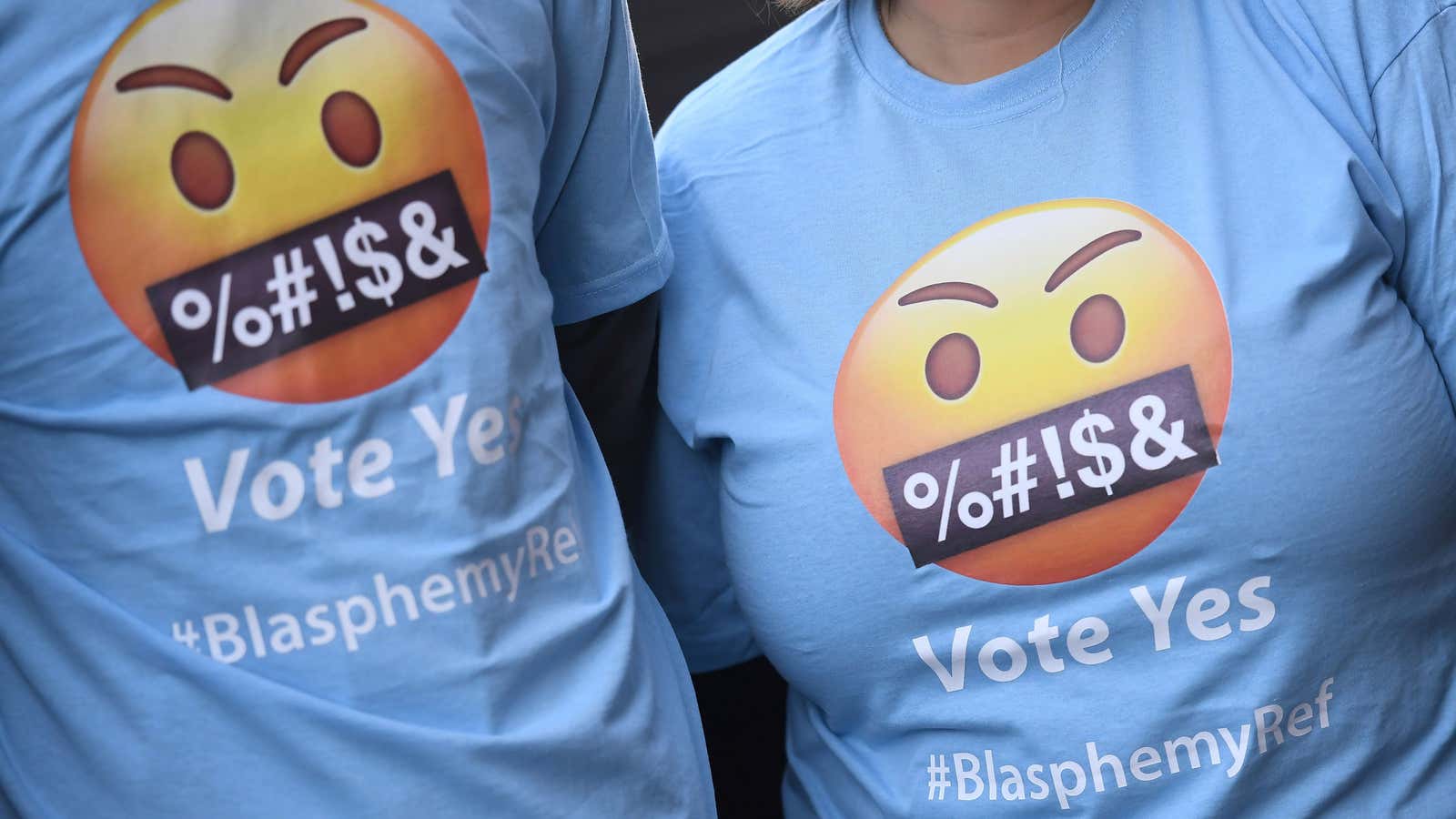On Friday (Oct. 26), citizens of the Republic of Ireland will vote to decide whether their nation can speak sacrilegiously about “God or sacred things” without legal consequences. The referendum will determine whether parliament should overturn both a 2009 law and a clause in the constitution that prohibits blasphemy.
Here are the answers to every question you may have about the vote:
What is blasphemy and why is Ireland voting on it?
The Irish Constitution, written in 1937, states that “the publication or utterance of blasphemous, seditious, or indecent matter is an offense which shall be punishable in accordance with law.”
In 2009, parliament passed an act that more clearly defined the boundaries of what the law considers “blasphemous.” According to the Irish Defamation Act, the key characteristics of a blasphemous text are that it be insulting to a religion, that it offend a large number of that religion’s adherents, and that the person writing or publishing it intended to cause that offense.
What is the punishment for blasphemy?
A person found guilty of blasphemy in Ireland can be liable to a fine of up to €25,000 ($28,532).
Has anyone ever been prosecuted for blasphemy in Ireland?
Not in recent memory. Former Irish prime minister Enda Kenny, who first proposed this referendum last year, said the last known prosecution in Ireland related to blasphemy was thought to be in 1855.
The laws made news in May last year when Irish police, known as the gardaí, launched an investigation for blasphemy into comments made by British comedian and actor Stephen Fry on an Irish public radio show, in which he questioned the existence of God. The investigation was dropped after the gardaí failed to find a large enough group of people offended by Fry’s comments.
What is the referendum about?
The upcoming referendum will decide if the Constitution should continue to say that publishing or saying something blasphemous is a criminal offense. If a majority of Irish people vote to repeal the provisions, then parliament will be able to change the constitution so that the word “blasphemous” will be removed.
Who supports the repeal?
In a recent poll conducted for the Irish Times, 51% of respondents said they would vote in favor of removing the offense of blasphemy, 19% said they would vote to retain it, 25% were undecided, and 4% said they would likely not vote.
A number of religious groups have expressed support for a Yes vote, including the Irish Catholic Bishops Conference, the Church of Ireland, and influential Catholic think tank, the Iona Institute. Secular rights groups like the Irish Council for Civil Liberties have come out in favor of removing the blasphemy law.
Who opposes it?
There is no coherent No camp, but the referendum does have its critics. Some have said that the vote itself is a waste of money, or that other constitutional amendments should have been prioritized over this one.
Others have said it is redundant, since no one has been prosecuted under blasphemy laws in over a century. Senator Ronan Mullen called the referendum “entirely unnecessary.”
Some oppose it on the grounds that blasphemy laws protect minority religious communities. That is the case of Ali Selim, a lecturer at Trinity College and a senior member of staff at the Islamic Cultural Centre of Ireland, who said that the inclusion of blasphemy in the constitution protects “the cohesiveness” of communities in Ireland and guarantees their rights and freedoms.
Why does this matter?
Religious freedom activists and secular activists argue that blasphemy laws are used to restrict freedom of speech, and to punish those who either disagree with the established state religion, or don’t believe in religion at all. Amnesty International points to the example of Pakistan, where “blasphemy laws are often used against religious minorities and others who are the target of false accusations, while emboldening vigilantes prepared to threaten or kill the accused.”
Members of the Irish government have said this referendum will allow them to set an example of progressive values to the world: “By removing this provision from our Constitution, we can send a strong message to the world that laws against blasphemy do not reflect Irish values and that we do not believe such laws should exist,” said justice minister Charlie Flanagan, who is leading the campaign for a Yes vote.
If tomorrow’s referendum passes, it will be the latest in a series of groundbreaking political and social changes that have shaken the majority-Catholic Republic of Ireland in recent years. These include the legalization of same-sex marriage in 2015, the election last year of Leo Varadkar, the son of an Indian immigrant who came out as gay in 2015, a landslide referendum vote last May that opened a path towards the legalization of abortion.
